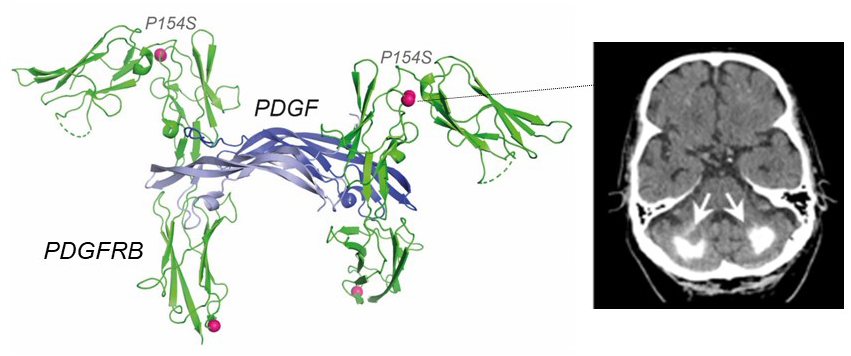

15/09/2021
Primary familial brain calcification (PFBC), formerly known as Fahr disease, is a rare inherited neurodegenerative disorder. Affected individuals may exhibit a range of motor, cognitive, psychiatric symptoms, starting in childhood or much later in life. The disease is characterized by calcium phosphate deposit nearby brain vessels, preferentially in basal ganglia, easily spotted on a CT-scan.
In one family and a few isolated patients, PFBC had been associated with mutations in the PDGFRB gene. In collaboration with Dr. Nicolas, expert in neurology and genetics at the University of Rouen (France), Sandrine Lenglez, Ariane Sablon and Jean-Baptiste Demoulin in our institute studied several PFBC patients who carried mutations of unknown significance in PDGFRB. One of them was a girl whose mother contacted the team directly to obtain information about her uncertain diagnosis. In addition, the team analyzed PDGFRB mutations associated with PFBC and other diseases, in a systematic manner. Their results show that all mutations causing PFBC inactivate PDGFRB, which encodes a receptor located at the cell surface. Several mechanisms of inactivation were identified including: lack of cell surface expression, inability to bind to the ligand, or loss of enzymatic activity. This work sheds light on the disease pathophysiology and has important clinical implications for diagnosis and prognosis, by defining precisely which mutations cause PFBC and which ones are harmless or related to other diseases. These results are now published in Human Molecular Genetics (Oxford University Press). Future research will focus on finding a treatment for the disease.
 |
Article describing this research
Distinct functional classes of PDGFRB pathogenic variants in primary familial brain calcification
Lenglez S, Sablon A, Fénelon G, Boland A, Deleuze JF, Boutoleau-Bretonnière C, Nicolas G, Demoulin JB
Human Molecular Genetics (2021); ddab258 - doi: 10.1093/hmg/ddab258